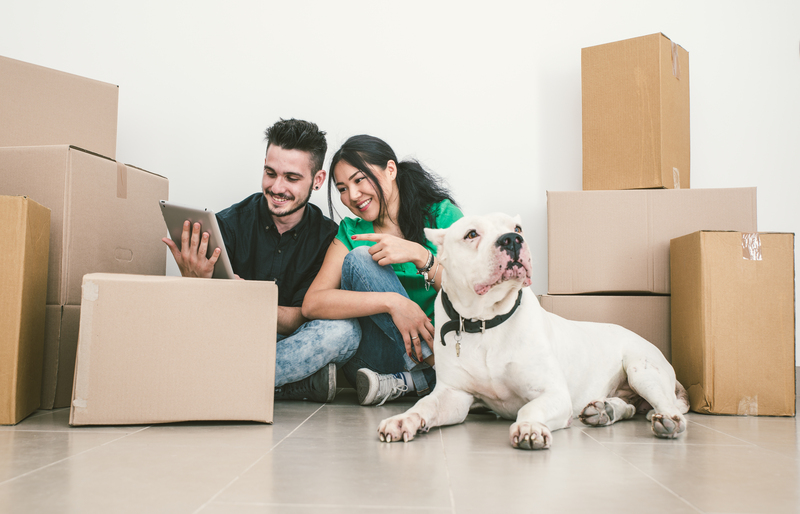Ease Your Relocation Stress: Declutter Wisely
Posted on 29/05/2025
Ease Your Relocation Stress: Declutter Wisely
Moving to a new home is often ranked among life's most stressful events, but decluttering efficiently can make the entire process smoother and less overwhelming. Whether you're relocating across the street or to a different city, embracing effective decluttering before a move can save you time, money, and effort. In this comprehensive article, we explore actionable steps and tips to help you declutter wisely and ease your relocation stress.

Why Proper Decluttering Is Essential Before Moving
Decluttering isn't just about getting rid of excess stuff. It's a practical strategy that lightens your load, both literally and mentally. Here's why strategic decluttering is important before relocating:
- Saves Money: Movers generally charge based on the total weight or volume of your possessions. Less stuff means lower costs.
- Saves Time: You don't waste precious hours packing, transporting, and unpacking items you no longer need or want.
- Reduces Stress: A streamlined packing process and reduced clutter lead to a sense of order and control.
- Creates a Fresh Start: Moving is an opportunity to reimagine your living space without the burden of unnecessary belongings.
Start Early: The Best Timing for Decluttering Before Your Move
One of the top relocation tips is to give yourself enough time to sort through your possessions. Starting early--ideally, at least 4 to 6 weeks before your moving date--allows for thoughtful decision-making and less pressure. Here's a simple timeline you can follow:
- 6 Weeks Out: Begin with lesser-used areas like basements, attics, and storage closets.
- 4 Weeks Out: Move on to kitchens, living rooms, and bedrooms.
- 2 Weeks Out: Finalize by sorting out everyday essentials and last-minute items.
Allocating a small chunk of time each day--say, 30 minutes--can make the process less overwhelming and prevent last-minute chaos.
How to Declutter Wisely Before Moving
If you want to ease your relocation stress, adopt a smart and systematic approach. Here's how to declutter efficiently as you prepare for your move:
1. Adopt a Category-Based Approach
Instead of decluttering by room, try doing so by category--such as clothes, books, papers, kitchenware, and sentimental items. This allows you to see the full extent of each type of item, making it easier to identify duplicates and excesses.
- Clothes: Donate, sell, or recycle garments you haven't worn in the past year.
- Books: Pass on novels you likely won't reread or reference manuals that are outdated.
- Papers: Digitize important documents and shred what's no longer needed.
2. Master the "Four-Box Method"
For each item, decide whether to place it into one of four boxes:
- Keep
- Donate/Sell
- Recycle
- Dispose
This method ensures nothing is left undecided and forces intentional sorting.
3. Be Honest: Ask Yourself the Right Questions
Sometimes, parting with possessions is tough. Use these questions to guide your choices:
- Have I used this item in the past year?
- Does it still work or fit?
- Does it bring me joy or serve a real need?
- Will it suit my new space or lifestyle?
Being ruthlessly honest is key to stress-free relocation through decluttering.
4. Tackle Sentimental Items Last
Personal mementos and keepsakes often bog down the decluttering process. Handle these last when you've built up your "decluttering muscle" and the rest of your move feels under control. Select a few meaningful keepsakes instead of keeping everything.
5. Utilize Smart Storage Solutions
If you're downsizing or moving into a more compact space, maximize your new storage. Invest in multi-purpose furniture, under-bed storage bins, and closet organizers. This makes it easier to declutter before moving and keep organized after relocation.
Tips for Stress-Free Packing After Decluttering
Once you've purged non-essentials, moving becomes so much simpler. Here's how to leverage your wise decluttering for a seamless pack-out:
- Label Everything: Mark boxes by both room and category for easy unpacking.
- Pack Essentials Separately: Create a "first night" bag with toiletries, medications, chargers, and a fresh outfit.
- Use Quality Packing Supplies: Invest in sturdy boxes, bubble wrap, and packing tape to protect your curated belongings.
- Photograph Electronics: Snap pictures of wiring setups for faster reassembly in your new place.
- Enlist Help: Whether hiring movers or asking friends, never hesitate to accept support during your transition.
Real-Life Benefits of Decluttering for Relocation
The perks of decluttering wisely for a move extend beyond just lower moving costs and less packing tape. Here are the biggest advantages as echoed by homeowners:
- Effortless Unpacking: Fewer boxes mean you'll settle into your new home faster, without wading through unnecessary items.
- Space Optimization: You can arrange and decorate your new space with intention and clarity.
- Mindful Living: You'll enjoy surroundings filled only with things you truly need or love.
- More Organized Finances: Selling unused goods can raise funds for moving expenses or new furniture.
- Eco-Friendliness: Donating and recycling decluttered items is more sustainable than dumping them in landfills.
How to Sell, Donate, or Responsibly Discard Items
Making wise decisions about where your unwanted possessions go is an important part of decluttering before a move. Here are the best options for your sorted items:
Donating Items
Many organizations gladly accept gently used furniture, clothes, books, and kitchenware. Popular destinations include:
- Goodwill and Salvation Army
- Local shelters and community centers
- Libraries (for books and media)
- Schools and daycare centers (toys, craft supplies)
Always check donation guidelines, as some charities have restrictions on what they accept.
Selling Items
To maximize your moving budget, sell high-value belongings you no longer need. Use outlets like:
- Online classifieds (Craigslist, Facebook Marketplace)
- Consignment shops
- eBay, Mercari, or Poshmark (for clothing and gadgets)
- Yard sales or moving sales
Pro tip: Start listing items as soon as you've sorted them out to allow enough time before your move.
Recycling and Disposal
For items that are neither donatable nor sellable, look for responsible recycling options. Many cities offer bulk waste pickups, e-waste disposal days, and recycling centers for electronics, batteries, and appliances. Be mindful of local regulations when discarding hazardous materials such as paints, chemicals, or old electronics.
Special Considerations: Downsizing or Long-Distance Moves
For those downsizing to a smaller home or undertaking a cross-country relocation, decluttering becomes even more critical. Here's how to tailor your approach for these scenarios:
Downsizing
- Measure New Spaces: Obtain floor plans and measure your furniture to ensure it fits.
- Prioritize Multi-Function Items: Keep what serves more than one use.
- Release Duplicates: Limit yourself to only one of any type of tool, appliance, or kitchen gadget.
Long-Distance Moves
- Factor in Move Costs: Review your moving contract for weight or volume restrictions.
- Pack Only Essentials: The farther you move, the less you should haul.
- Digitize When Possible: Swap paperwork, photos, and entertainment media for digital copies.
Declutter with Kids and Pets in Mind
Moving families and pet owners face particular challenges, as sentimental attachments and essential pet needs add to the cargo.
For Families
- Get Kids Involved: Let them decide which toys to keep and involve them in packing their favorites.
- Preserve Memories Digitally: Scan artwork or take photos of large projects to save space while preserving memories.
For Pet Owners
- Streamline Supplies: Evaluate pet beds, toys, and accessories for condition and necessity.
- Ensure Pet Safety: Keep pet essentials packed last, and ensure carriers and food are easily accessible on moving day.

Useful Tools and Apps to Ease Decluttering and Moving Stress
Technology can be a powerful ally in your decluttering and moving journey. Consider these tools and apps to make the process as seamless as possible:
- Trello or Notion: Organize checklists, moving tasks, and packing schedules in one accessible place.
- Sortly: Create a visual inventory of boxes and track what you've packed.
- Letgo, OfferUp, or Facebook Marketplace: Effortlessly sell or give away unneeded items to local buyers.
- TaskRabbit or Handy: Hire help for heavy lifting, hauling, or last-minute cleaning.
Conclusion: Declutter Wisely for a Stress-Free Relocation
Relocating doesn't have to be chaotic. By decluttering before you move, you pave the way for a more organized, cost-effective, and emotionally pleasant transition. Remember to:
- Start decluttering well ahead of your move.
- Be strategic--sort by category and follow the four-box method.
- Ask honest questions about your belongings and let go of guilt surrounding unused items.
- Donate, recycle, or sell responsibly to benefit others and the environment.
- Enjoy a smooth, streamlined move and a peaceful start in your new home!
Take control of your relocation experience. Ease your relocation stress by decluttering wisely, making your move not only simpler, but also the beginning of a new, more intentional chapter in your life.
Latest Posts
Ultimate Pre-Move Out Cleaning Guide for Homeowners
Making Your House Move a Calming Adventure
How to Safely Move Your Bed and Mattress
Smart Ways to Store Your Freezer When Off Duty
Uplift Your Sofa's Lifespan: Proven Methods for Secure Long-Term Storage



